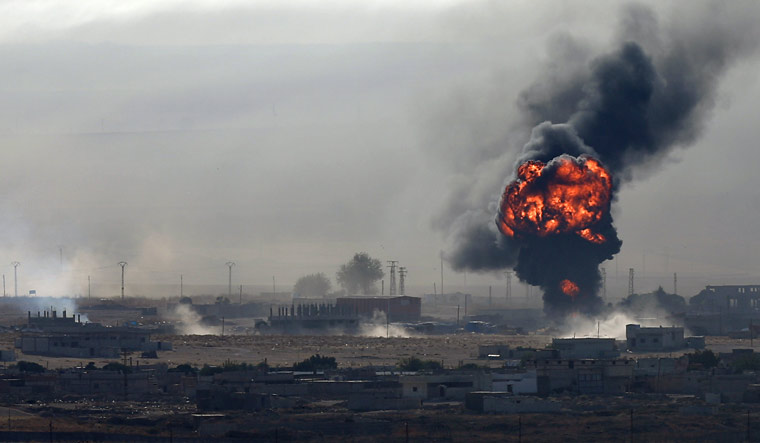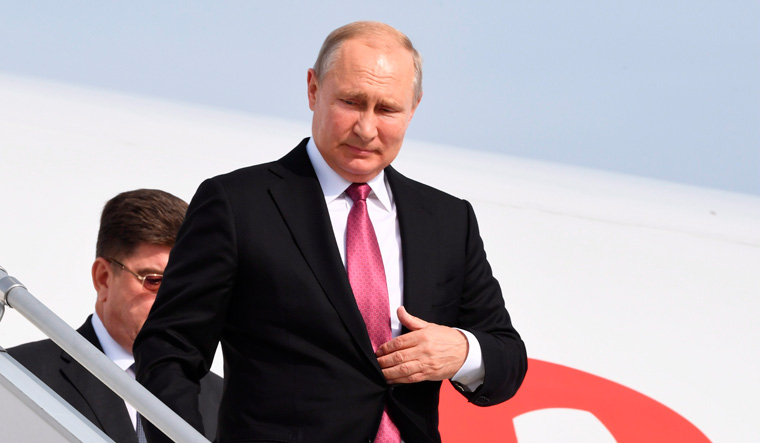Russia has quickly moved into to fill the void left by the United States in northern Syria, deploying troops to keep apart advancing Syrian government forces and Turkish troops. At the same time, tensions grew within NATO as Turkey defied growing condemnation of its invasion from its Western allies.
"We will ensure that no IS fighters leave northeastern Syria," Turkish President Recep Tayyip Erdogan wrote in the Wall Street Journal. He vowed not to allow any Islamic State fighter escape northern Syria, in an op-ed published Tuesday, following fears from Western nations over its offensive in the region.
ALSO READ
- How US bill to end post-study work permit would impact Indian students
- Trump aces cognitive health test at 78, but transparency remains a question
- Indian-origin 'Godfather'? Meet Anand Shah, the politician who was arrested over links with Lucchese mafia family
- US Commander in Greenland ousted over alleged email criticising J.D. Vance's Denmark comments
- VIDEO | Tail of helicopter that crashed in Hudson River in US came apart mid-air before it fell into the water
- Sex and the CEO: The fall of Gradiant chief Anurag Bajpayee held in US over luxury brothel scandal
- New Islamic militant group emerges in Syria; Iran-backed Uli al-Baas gears up to resist US, Israel
He added that Western countries were hypocritical to worry that Turkey's operation against Kurdish militants risked a mass escape of jihadists.
"The same countries that lecture Turkey on the virtues of combating ISIS today failed to stem the influx of foreign terrorist fighters in 2014 and 2015," Erdogan wrote.
Now touching a seventh day, Turkey's offensive against Kurdish fighters has caused tens of thousands to flee their homes, has upended alliances and is re-drawing the map of northern Syria for yet another time in the 8-year-old war.
Russia moved quickly to further entrench its role as a power broker after US President Donald Trump ordered the pullout of American forces in northeastern Syria. The American move effectively abandoned the Kurdish fighters who were allied with the US and cleared the way for Turkey's invasion aimed at crushing them.
Desperate for a new protector, the Kurdish administration struck a deal with the Russia-backed government of Syrian President Bashar Assad, whose forces on Sunday began moving into Kurdish-administered areas to shield them against Turkey.
"In order to prevent and confront this aggression, an agreement has been reached with the Syrian government... so that the Syrian army can deploy along the Syrian-Turkish border to assist the (Kurdish-led) Syrian Democratic Forces (SDF)," SDF said in a statement on its Facebook page.
Syrian troops waved flags after they rolled into Manbij, a flashpoint town west of the Euphrates River that Turkey had been aiming to capture and wrest from Kurdish control. Video by Russian journalists with the troops showed what appeared to be an abandoned outpost where US forces had been stationed.
A US military spokesman, Col. Myles B. Caggins, confirmed US troops had completed their pullout from Manbij. During the withdrawal, contacts were kept open with the Turks and Russians to ensure the several hundred American forces there got out safely, US officials said.
US troops have had outposts in Manbij since 2017, when they went in to avert a battle over the town between Turkish and Kurdish fighters.

Now Russia was playing that role. Outside Manbij, Russian troops patrolled front lines between Turkish and Syrian army positions to keep them apart, Russia's defense ministry said.
"No one is interested" in fighting between Syrian government troops and Turkish forces, said Alexander Lavrentyev, Moscow's envoy for Syria. Russia "is not going to allow it," he told Russian state news agencies.
Kelly Craft, the US ambassador to the United Nations, told reporters Washington is "deeply concerned" that Russian troops are patrolling between the two sides.
Russian Defense Minister Sergei Shoigu spoke to US Defense Secretary Mark Esper to discuss "issues of mutual interest in the context of situation in Syria," the Russian Defense Ministry said in a brief statement, without elaborating.
Russia has been a staunch ally of Assad for decades and entered the Syrian conflict in 2015, providing air power that eventually turned the tide of the war in his favor. The Russian military has shipped weapons to Damascus, trained thousands of troops and put its advisers in key Syrian military units.
In the first week of the Turkish assault, at least 154 fighters from the Kurdish-led Syrian Democratic Forces have been killed, as well as 128 fighters from Turkish-backed Syrian factions, according to the Syrian Observatory for Human Rights, a monitor of the war. It said at least 69 civilians have been killed in Syria.
Marginalised for decades, Syria's minority Kurds carved out a de facto autonomous region across some 30 percent of the nation's territory after the devastating war broke out in 2011.
Turkey says six of its soldiers have died, as well as at least 20 Turkish civilians killed by Kurdish mortar fire across the border.
A US official said the approximately 1,000 US troops being withdrawn from northern Syria will reposition in Iraq, Kuwait and possibly Jordan. The US forces in Iraq could conduct cross-border operations against the Islamic State group in Syria as they did before creating the now-abandoned partnership with Syrian Kurdish-led forces, the official said, speaking on condition of anonymity to discuss sensitive planning for a US pullout.
Trump on Monday announced sanctions aimed at Turkey's economy. The US called on Turkey to stop the offensive and declare a cease-fire, while European Union countries moved to broaden an arms sale embargo against their easternmost ally.
Trump was sending Vice President Mike Pence, Secretary of State Mike Pompeo and national security adviser Robert O'Brien to Ankara to try to begin negotiations to stop the fighting. Pence said Trump spoke directly to Turkish President Recep Tayyip Erdogan, who promised not to attack the border town of Kobani, which in 2015 saw the Islamic State group's first defeat in a battle by the US-backed Kurdish fighters.
Erdogan made clear, however, that he had no intention of halting the Turkish offensive. "They say 'declare a ceasefire'. We could never declare a ceasefire," he told reporters.
-Inputs from PTI



